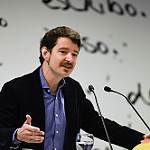Education, complexity and Internet
Above an excerpt of the presentation given during my last talk at the Universidad Europea, in Spain. The text is cross posted from the institutional website – and here.
Universidad Europea has launched the second edition of the discussion cycle Education. Educate to Transform with a lecture given by Cristóbal Cobo, a researcher at the University of Oxford, on the opportunities technology offers education.
During the session, Cristóbal Cobo set out his vision of how technology has revolutionized society to the extent it has exerted an increasingly greater impact on the field of education: “The value of knowledge and the way in which we learn has been redefined. If we made a tower out of all the reference books there are in the world, the tower would stretch from here to Pluto 20 times over”. The challenge, as such, is no longer having access to information but lies in the possibility of having sufficient time to handle it.
“There are those that insist that the problem of education using new technologies is the same as those of the ice makers when the fridge was invented. However, we do not offer ice, but cold. We, as educators, teach how to learn“, continued Cobo.
To conclude, the researcher emphasized how new technologies enhance education: “I believe that we should not fight technology, because it brings together many interests, not only the educational. We have to introduce technologies into the classroom, at the same time as developing a methodological change in the way the professor is trained so that they use technologies without fear”. As a result, in this new educational context, the professor has to become “a driving force, putting forward challenges so that the student learns to learn using the tools they have to hand. In this highly complex ecosystem that is the Internet, a greater level of learning is achieved by the student and greater dedication and effort by the professor”.
Cristóbal Cobo is a researcher affiliated to the Oxford Internet Institute and collaborates on different projects undertaken by the European Commission. He is co-author, together with J. Moravec, of Invisible Learning: Towards a new ecology in education, among other works. His speech marked the start of the second edition of Education, a forum that this year will be attended by experts including the former Minister for Education, Ángel Gabilondo and Adrian Kearney, director of the International Baccalaureate Foundation for Africa, Europe and the Middle East.
[More information available in Spanish here]
Posted in Education and ICT on Feb 13, 2014




